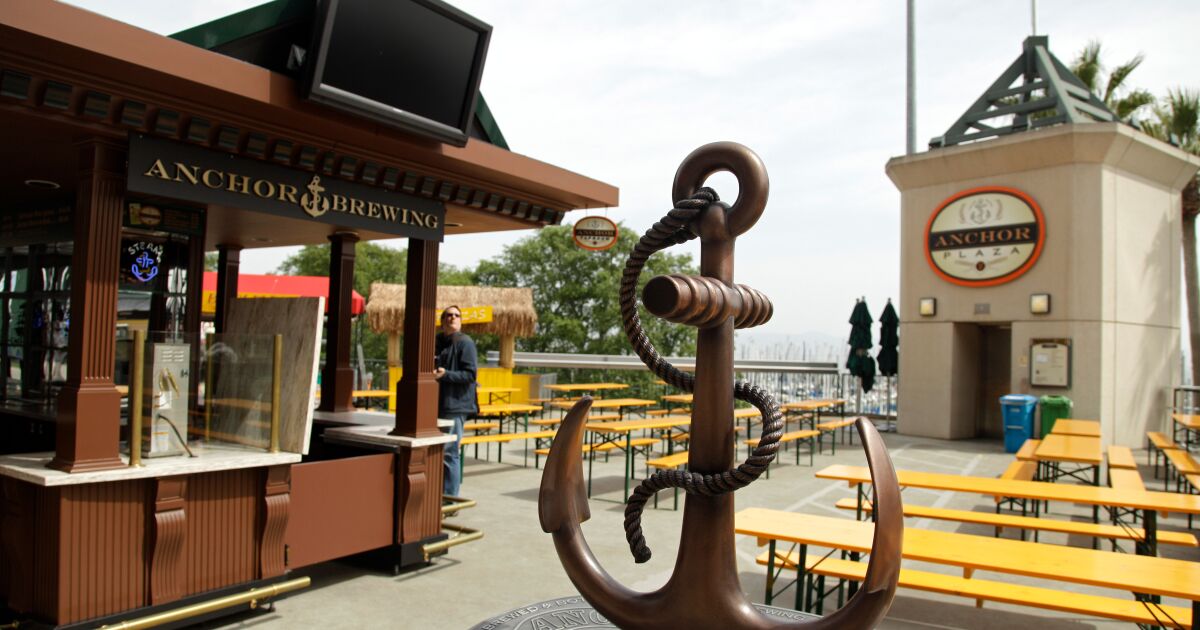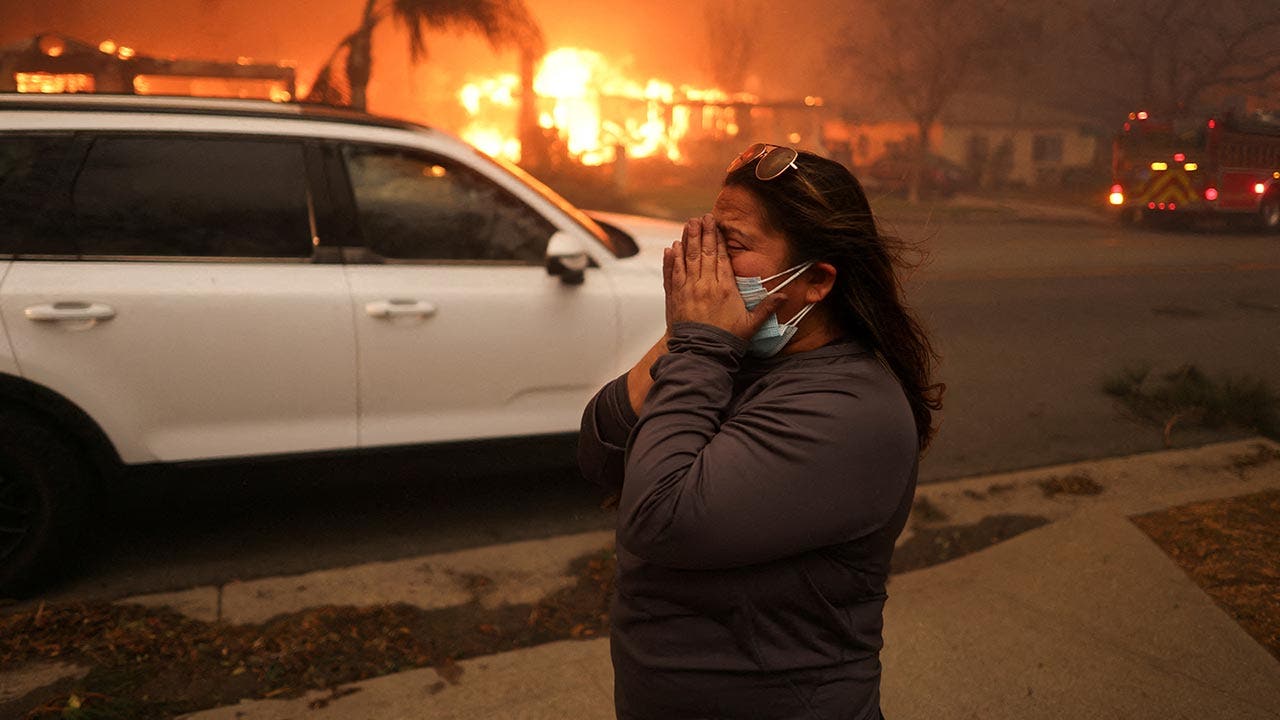Business
San Francisco’s historic Anchor Brewing shuts down, citing ‘sluggish’ business

San Francisco’s historic Anchor Brewing Co. will shut down and is no longer making beer, the company announced, signaling the end of a 127-year run for the California institution that weathered wars, Prohibition and the great earthquake of 1906.
The brewery was losing around $10 million per year since COVID-19 “significantly affected” its business, according to parent company Sapporo Holdings Ltd.
“This was an extremely difficult decision that we reached only after many months of careful evaluation,” said Sam Singer, a spokesperson for Anchor Brewing. “We recognize the importance and historic significance of Anchor to San Francisco and to the craft brewing industry, but the impacts of the pandemic, inflation, especially in San Francisco, and a highly competitive market left us with no option but to make this sad decision to cease operations.”
Though production has stopped, the brewery will continue to distribute its remaining stock and operate its on-site taproom through the end of the month.
Anchor Brewing will begin the process of assignment for the benefit of creditors, which is a common move for distressed businesses as an alternative to official bankruptcy proceedings.
The brewery was founded in 1896, when Ernst Baruth and Otto Schinkel Jr. bought a beer-and-billiards hall on Pacific Street in San Francisco and dubbed it Anchor. The original location burned down in the blazes that followed the 1906 earthquake.
The brewery is most famous for its Gold Rush-era steam-style beer, Anchor Steam.
The news of its closure comes just a month after Anchor decided to stop distributing nationwide to focus on California, which already made up 70% of its sales.
Singer said the decision to stop nationwide sales and cease production of the company’s popular Christmas Ale were last-ditch efforts taken as Anchor hoped to find alternatives to closing.
Anchor Brewing was bought for around $85 million by Japanese beer giant Sapporo in 2017. Employees at Anchor unionized in 2019 following the sale; the union was in the process of negotiating its second contract when the shutdown was announced.
“Over the past several years, we implemented a variety of measures to improve the business, such as releasing new products, product renewals, and making brand investments,” Sapporo President Masaki Oga wrote in a release announcing the decision. “However, Anchor’s business performance continued to be sluggish.”

Business
Craft supplies retailer Joann declares bankruptcy for the second time in a year

The craft supplies and fabric retailer Joann filed for bankruptcy for the second time in less than a year, as the chain wrestles with declining sales and inventory shortages, the company said Wednesday.
The retailer emerged from a previous Chapter 11 bankruptcy process last April after eliminating $505 million in debt. Now, with $615 million in liabilities, the company will begin a court-supervised sale of its assets to repay creditors. The company owes an additional $133 million to its suppliers.
“We hope that this process enables us to find a path that would allow Joann to continue operating,” said interim Chief Executive Michael Prendergast in a statement. “The last several years have presented significant and lasting challenges in the retail environment, which, coupled with our current financial position and constrained inventory levels, forced us to take this step.”
Joann’s more than 800 stores and websites will remain open throughout the bankruptcy process, the company said, and employees will continue to receive pay and benefits. The Hudson, Ohio-based company was founded in 1943 and has stores in 49 states, including several in Southern California.
According to court documents, Joann began receiving unpredictable and inconsistent deliveries of yarn and sewing items from its suppliers, making it difficult to keep its shelves stocked. Joann’s suppliers also discontinued certain items the retailer relied on.
Along with the “unanticipated inventory challenges,” Joann and other retailers face pressure from inflation-wary consumers and interest rates that were for a time the highest in decades. The crafts supplier has also been hindered by competition from others in the space, including Michael’s, Etsy and Hobby Lobby, said Retail Wire Chief Executive Dominick Miserandino.
“It did not necessarily learn to evolve like its nearby competitors,” Miserandino said of Joann. “Not many people have heard of Joann in the way they’ve heard of Michael’s.”
Joann is not the first retailer to continue to struggle after going through bankruptcy. The party supply chain Party City announced last month it would be shutting down operations, after filing for and emerging from Chapter 11 bankruptcy in 2023.
Over the last two years, more than 60 companies have filed for bankruptcy for a second or third time, Bloomberg reported, based on information from BankruptcyData. That’s the most over a comparable period since 2020, when the COVID-19 pandemic kept shoppers home.
Discount chain Big Lots filed for bankruptcy last September, and the Container Store, a retailer offering storage and organization products, declared bankruptcy last month. Companies that rely heavily on brick-and-mortar locations are scrambling to keep up with online retailers and big-box chains. Fast-casual restaurants such as Red Lobster and Rubio’s Coastal Grill have also struggled.
High prices have prompted consumers to pull back on discretionary spending, while rising operating and labor costs put additional pressure on businesses, experts said. The U.S. annual inflation rate for 2024 was 2.9%, down from 3.4% in 2023. But inflation has been on the rise since September and remains above the Federal Reserve’s goal of 2%.
If a sale process for Joann is approved, Gordon Brothers Retail Partners would serve as the stalking-horse bidder and set the floor for the auction.
Business
U.S. Sues Southwest Airlines Over Chronic Delays

The federal government sued Southwest Airlines on Wednesday, accusing the airline of harming passengers who flew on two routes that were plagued by consistent delays in 2022.
In a lawsuit, the Transportation Department said it was seeking more than $2.1 million in civil penalties over the flights between airports in Chicago and Oakland, Calif., as well as Baltimore and Cleveland, that were chronically delayed over five months that year.
“Airlines have a legal obligation to ensure that their flight schedules provide travelers with realistic departure and arrival times,” the transportation secretary, Pete Buttigieg, said in a statement. “Today’s action sends a message to all airlines that the department is prepared to go to court in order to enforce passenger protections.”
Carriers are barred from operating unrealistic flight schedules, which the Transportation Department considers an unfair, deceptive and anticompetitive practice. A “chronically delayed” flight is defined as one that operates at least 10 times a month and is late by at least 30 minutes more than half the time.
In a statement, Southwest said it was “disappointed” that the department chose to sue over the flights that took place more than two years ago. The airline said it had operated 20 million flights since the Transportation Department enacted its policy against chronically delayed flights more than a decade ago, with no other violations.
“Any claim that these two flights represent an unrealistic schedule is simply not credible when compared with our performance over the past 15 years,” Southwest said.
Last year, Southwest canceled fewer than 1 percent of its flights, but more than 22 percent arrived at least 15 minutes later than scheduled, according to Cirium, an aviation data provider. Delta Air Lines, United Airlines, Alaska Airlines and American Airlines all had fewer such delays.
The lawsuit was filed in the United States District Court for the Northern District of California. In it, the government said that a Southwest flight from Chicago to Oakland arrived late 19 out of 25 trips in April 2022, with delays averaging more than an hour. The consistent delays continued through August of that year, averaging an hour or more. On another flight, between Baltimore and Cleveland, average delay times reached as high as 96 minutes per month during the same period. In a statement, the department said that Southwest, rather than poor weather or air traffic control, was responsible for more than 90 percent of the delays.
“Holding out these chronically delayed flights disregarded consumers’ need to have reliable information about the real arrival time of a flight and harmed thousands of passengers traveling on these Southwest flights by causing disruptions to travel plans or other plans,” the department said in the lawsuit.
The government said Southwest had violated federal rules 58 times in August 2022 after four months of consistent delays. Each violation faces a civil penalty of up to $37,377, or more than $2.1 million in total, according to the lawsuit.
The Transportation Department on Wednesday also said that it had penalized Frontier Airlines for chronically delayed flights, fining the airline $650,000. Half that amount was paid to the Treasury and the rest is slated to be forgiven if the airline has no more chronically delayed flights over the next three years.
This month, the department ordered JetBlue Airways to pay a $2 million fine for failing to address similarly delayed flights over a span of more than a year ending in November 2023, with half the money going to passengers affected by the delays.
Business
California drops zero-emission truck rules after inaction by Biden's EPA

California government’s plan to phase out heavy-duty diesel trucks and diesel locomotives has been derailed.
The ambitious plan aimed at reducing local pollution and global greenhouse gases required special waivers from the federal government. The Biden administration hadn’t granted the waivers as of this week, and rather than face almost certain denial by the incoming Trump administration, the state withdrew its waiver request.
That means the far-reaching regulations issued by the California Air Resources Board in 2022 to ban new diesel truck sales by 2036 and force fleet owners to take them off the road by 2042 won’t be enforced. Known as the Advanced Clean Fleets rule, the idea was to replace those trucks with electric and hydrogen-powered versions, which dramatically reduce emissions but are currently two to three times more expensive.
“While we are disappointed that U.S. EPA was unable to act on all the requests in time, the withdrawal is an important step given the uncertainty presented by the incoming administration that previously attacked California’s programs to protect public health and the climate and has said will continue to oppose those programs,” CARB Chair Liane Randolph said in a prepared statement.
Environmentalists reacted with deep disappointment.
“To meet basic standards for healthy air, California has to shift to zero-emissions trucks and trains in the coming years. Diesel is one of the most dangerous kinds of air pollution for human health,” Paul Cort, director of Earthjustice’s Right to Zero campaign, said in a prepared statement. “We’ll be working tirelessly in the coming years — and calling on Gov. [Gavin] Newsom, state legislators, and our air quality regulators to join us — to clean up our freight system and fix the mess [U.S.] EPA’s inaction has created.”
The trucking industry is pleased at the result, but hopes to continue working with California on environmental issues.
“This rule was flawed, and was not reflective of reality,” said Matt Schrap, chief executive at the Harbor Trucking Assn. “Ideally this is an opportunity to take a step back and look at a program that would be more sustainable.”
Trucking representatives had filed a lawsuit to block the rules, arguing they would cause irreparable harm to the industry and the wider economy. Train operators said no zero-emission locomotives exist on the commercial market.
Schrap said “the most important thing is the EPA could have issued the waiver and they didn’t.”
The EPA said it acknowledges California’s withdrawal of the waiver requests “and as a result is taking no further action on CARB’s prior requests and considers these matters closed.”
President-elect Donald Trump is a champion of the fossil fuel industry, making it unlikely that his administration would have approved the California waivers. The state could, however, pursue waivers at some point in the future.
Under the federal Clean Air Act, California is allowed to set its own air standards, and other states are allowed to follow California’s lead. But federal government waivers are required. Most of California’s waivers have been granted, including approval in December of a California ban on new sales of gas-powered cars and light trucks by 2035.
-
/cdn.vox-cdn.com/uploads/chorus_asset/file/25822586/STK169_ZUCKERBERG_MAGA_STKS491_CVIRGINIA_A.jpg)
/cdn.vox-cdn.com/uploads/chorus_asset/file/25822586/STK169_ZUCKERBERG_MAGA_STKS491_CVIRGINIA_A.jpg) Technology7 days ago
Technology7 days agoMeta is highlighting a splintering global approach to online speech
-

 Science4 days ago
Science4 days agoMetro will offer free rides in L.A. through Sunday due to fires
-
/cdn.vox-cdn.com/uploads/chorus_asset/file/25821992/videoframe_720397.png)
/cdn.vox-cdn.com/uploads/chorus_asset/file/25821992/videoframe_720397.png) Technology1 week ago
Technology1 week agoLas Vegas police release ChatGPT logs from the suspect in the Cybertruck explosion
-

 Movie Reviews1 week ago
Movie Reviews1 week ago‘How to Make Millions Before Grandma Dies’ Review: Thai Oscar Entry Is a Disarmingly Sentimental Tear-Jerker
-

 Health1 week ago
Health1 week agoMichael J. Fox honored with Presidential Medal of Freedom for Parkinson’s research efforts
-

 Movie Reviews1 week ago
Movie Reviews1 week agoMovie Review: Millennials try to buy-in or opt-out of the “American Meltdown”
-

 News1 week ago
News1 week agoPhotos: Pacific Palisades Wildfire Engulfs Homes in an L.A. Neighborhood
-

 World1 week ago
World1 week agoTrial Starts for Nicolas Sarkozy in Libya Election Case


/cdn.vox-cdn.com/uploads/chorus_asset/file/25833258/Screenshot_2025_01_15_at_8.11.01_PM.png)











